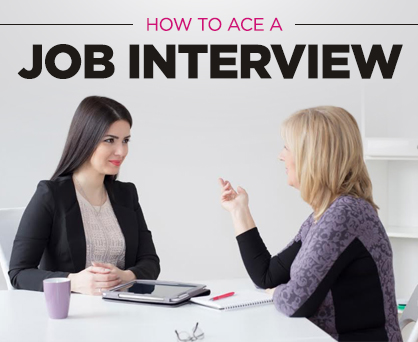Questions to Ask During a Job Interview
Always ask one more question
When you're at a job interview, it's not just about the questions they ask you, but the ones you ask your potential employer. Any candidate who sits across from a hiring manager and doesn't have questions about the job will raise a red flag.
Here are questions that top recruiters say you should consider asking when you're at your next job interview.

Research the company first
Before you go in for a job interview, do your due diligence and research the company. Find the latest news articles about the company, and its top executives, and if you can discreetly research the hiring manager through their LinkedIn profile or Facebook profile or Instagram account, all the better. Information is power, and even if you don't share your knowledge about their fetish for peanut butter cookies at midnight (and we advise you don't bring it up), knowing everything you can about the person interviewing you gives you an advantage.
Develop your questions
Cameron Weller, director of sales and strategic recruitment for Betts Recruiting, said, “You should always prepare for interviews with a list of 8-10 killer questions that are thoughtful and specifically tailored to the company and interviewer. Cover your bases with 2-3 questions about the company, their product or service, the interviewer, and the specific role. You should always go beyond just asking a question. Provide detailed context to show you did your research. For example, instead of asking, 'what makes your top sales rep successful,' you could say, 'I know you are aggressively building out the sales team. What are you looking for in new hires, and what is your top rep doing to be successful?'”
You should always have questions to ask during a job interview. Your thoughtful questions should be focused on the job and the needs of the hiring company, and will show that you’ve done your homework and are genuinely interested in this specific opportunity. Asking good questions also helps to make the interview a dialogue rather than an interrogation and enhances your credentials, said Les Sper, a recruiter with Gilman Partners.
A great question to save for the end of the interview will reinforce your interest and also probe for any unspoken concerns of the interviewer, Sper said.
“For example, you could ask, 'Based on what we’ve covered today I believe I am a very good potential fit for this position. Do you have any significant concerns about my ability to do this job well?' Most of the time the interviewer will answer 'no' and mentally will have moved you forward in the screening process. If the answer is 'yes' you have an opportunity to address any expressed concerns while still in a face-to-face conversation.
Kent Burns is a recruiter with Sanford Rose Associates, and he said that the questions you ask make you either stand out, or be forgotten as a candidate. “Good questions are indicative of candidate preparation, insight and intelligence.”
Here are Burns top suggestions:
- You should craft questions that fit your audience. Candidates should ask higher level interviewers strategic and big picture questions like: “From your perspective, what are the most important issues the company is facing right now?” “How does this role (that I am interviewing for) play a part addressing those issues?” “When you think about the top performers at this company, what attributes come to mind…is there a common denominator that you can identify?”
- Lower level interviewers should get more tactical and job-specific questions, like: “Who are the most important internal and external customers for this position?” “When you think about the person who just had this position, what made them successful at it? Where did they struggle?”
- A candidate should have a couple of questions that they ask every interviewer, to check for consistency across their answers. “Why did you come to work here?” “Why do you stay here?” “How would you describe the culture here?” “What is the company’s top priority for this year?”
- A candidate should ask some question that will provide them real time information that they can use to better position themselves in the interview. For example: “If you could fast-forward to future to a place where this person has been hired, what were the 2-3 most important criteria that drove the decision?” The answer to that question will give you some huge clues as to how you better be positioning yourself in this interview.
- You should always have one more question. To say, “No, you’ve pretty much answered all my questions” is totally unacceptable. The magic question to ask when you’re at this point is this: “What else is important to you about this position or my background that we haven’t had a chance to speak about?
- That question is magic, because it opens the door to make sure nothing gets left on the table that could become an issue after the interview.



